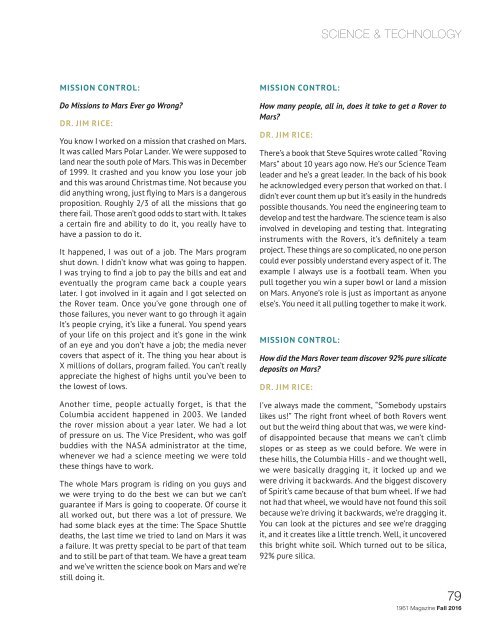1961 Magazine Fall 2016
1961 Magazine features hot new talent and fresh faces in fashion, beauty, technology and lifestyle. Be the first "in the know" with 1961!
1961 Magazine features hot new talent and fresh faces in fashion, beauty, technology and lifestyle. Be the first "in the know" with 1961!
You also want an ePaper? Increase the reach of your titles
YUMPU automatically turns print PDFs into web optimized ePapers that Google loves.
SCIENCE & TECHNOLOGY<br />
MISSION CONTROL:<br />
Do Missions to Mars Ever go Wrong?<br />
DR. JIM RICE:<br />
You know I worked on a mission that crashed on Mars.<br />
It was called Mars Polar Lander. We were supposed to<br />
land near the south pole of Mars. This was in December<br />
of 1999. It crashed and you know you lose your job<br />
and this was around Christmas time. Not because you<br />
did anything wrong, just flying to Mars is a dangerous<br />
proposition. Roughly 2/3 of all the missions that go<br />
there fail. Those aren’t good odds to start with. It takes<br />
a certain fire and ability to do it, you really have to<br />
have a passion to do it.<br />
It happened, I was out of a job. The Mars program<br />
shut down. I didn’t know what was going to happen.<br />
I was trying to find a job to pay the bills and eat and<br />
eventually the program came back a couple years<br />
later. I got involved in it again and I got selected on<br />
the Rover team. Once you’ve gone through one of<br />
those failures, you never want to go through it again<br />
It’s people crying, it’s like a funeral. You spend years<br />
of your life on this project and it’s gone in the wink<br />
of an eye and you don’t have a job; the media never<br />
covers that aspect of it. The thing you hear about is<br />
X millions of dollars, program failed. You can’t really<br />
appreciate the highest of highs until you’ve been to<br />
the lowest of lows.<br />
Another time, people actually forget, is that the<br />
Columbia accident happened in 2003. We landed<br />
the rover mission about a year later. We had a lot<br />
of pressure on us. The Vice President, who was golf<br />
buddies with the NASA administrator at the time,<br />
whenever we had a science meeting we were told<br />
these things have to work.<br />
The whole Mars program is riding on you guys and<br />
we were trying to do the best we can but we can’t<br />
guarantee if Mars is going to cooperate. Of course it<br />
all worked out, but there was a lot of pressure. We<br />
had some black eyes at the time: The Space Shuttle<br />
deaths, the last time we tried to land on Mars it was<br />
a failure. It was pretty special to be part of that team<br />
and to still be part of that team. We have a great team<br />
and we’ve written the science book on Mars and we’re<br />
still doing it.<br />
MISSION CONTROL:<br />
How many people, all in, does it take to get a Rover to<br />
Mars?<br />
DR. JIM RICE:<br />
There’s a book that Steve Squires wrote called “Roving<br />
Mars” about 10 years ago now. He’s our Science Team<br />
leader and he’s a great leader. In the back of his book<br />
he acknowledged every person that worked on that. I<br />
didn’t ever count them up but it’s easily in the hundreds<br />
possible thousands. You need the engineering team to<br />
develop and test the hardware. The science team is also<br />
involved in developing and testing that. Integrating<br />
instruments with the Rovers, it’s definitely a team<br />
project. These things are so complicated, no one person<br />
could ever possibly understand every aspect of it. The<br />
example I always use is a football team. When you<br />
pull together you win a super bowl or land a mission<br />
on Mars. Anyone’s role is just as important as anyone<br />
else’s. You need it all pulling together to make it work.<br />
MISSION CONTROL:<br />
How did the Mars Rover team discover 92% pure silicate<br />
deposits on Mars?<br />
DR. JIM RICE:<br />
I’ve always made the comment, “Somebody upstairs<br />
likes us!” The right front wheel of both Rovers went<br />
out but the weird thing about that was, we were kindof<br />
disappointed because that means we can’t climb<br />
slopes or as steep as we could before. We were in<br />
these hills, the Columbia Hills - and we thought well,<br />
we were basically dragging it, it locked up and we<br />
were driving it backwards. And the biggest discovery<br />
of Spirit’s came because of that bum wheel. If we had<br />
not had that wheel, we would have not found this soil<br />
because we’re driving it backwards, we’re dragging it.<br />
You can look at the pictures and see we’re dragging<br />
it, and it creates like a little trench. Well, it uncovered<br />
this bright white soil. Which turned out to be silica,<br />
92% pure silica.<br />
79<br />
<strong>1961</strong> <strong>Magazine</strong> <strong>Fall</strong> <strong>2016</strong>


